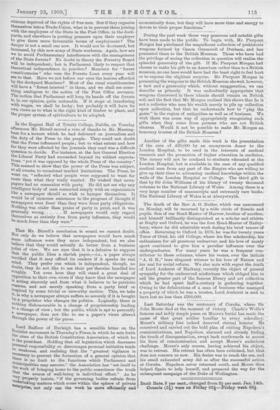That Mr. Birroll's conclusion is sound we cannot doubt. Not
only do we believe that newspapers would have much more influence were they more independent, but we also believe that they would actually do better from a business Point of view. We are sure that it is a delusion to suppose that the public likes a slavish paper,—i.e., a paper always terrified that it may offend its readers if it speaks its real Incid- They prefer one which is independent, though, no doubt, they do not like to see their pet theories handled too roughly. Yet even here they will stand a great deal of °. PPosition to their own views if they know that the newspaper rs acting sincerely and from what it believes to be patriotic reasons, and not merely speaking from a party brief or 11IaPired by some trivial or unworthy motive. This, we take it, Is why a newspaper always suffers so severely if it is bought a proprietor who changes its politics. Logically, there is nothing dishonourable in a change of proprietorship leading to a change of view ; but the public, which is apt to personify a newspaper, does not like to see a paper's views altered through the power of the purse.






































 Previous page
Previous page